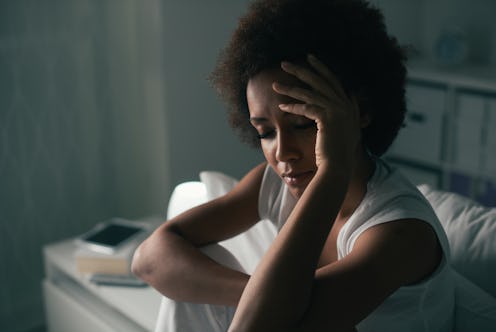Life
7 Weird Things You Didn’t Know Could Cause Insomnia
Chances are good that you've experienced insomnia at some point in your life. According to the American Sleep Association, between 50 and 70 million adults have a sleep disorder, and up to 20 percent of those folks have serious insomnia, with periods of trouble sleeping lasting up to three months, the American Academy of Sleep Medicine reported. Chances are, you're also aware of common causes of insomnia, like drinking too much caffeine and an out-of-whack sleep schedule, but there are plenty of weird things you didn't know cause insomnia, and those could be seriously messing with your ability to get quality zzz's.
Dr. Jerald Simmons of Houston-based clinic Comprehensive Sleep Medicine Associates tells Bustle that people with insomnia can suffer from sleep initiation (also called sleep onset) insomnia, or sleep maintenance insomnia. Sleep initiation is what it sounds like; folks who suffer from it will have trouble getting to sleep, and they run the risk of starting to associate anxiety with bedtime. People with sleep maintenance insomnia, however, will get to sleep, but will suffer "frequent and prolonged nocturnal awakenings," according to sleep medicine group Tuck.
Whether you have initiation or maintenance insomnia, whether you have chronic insomnia or the occasional bout, being aware of these lesser-known insomnia causes can help you better maintain your sleep schedule.
1. Brushing With Mint-Flavored Toothpaste
Get ready for one of the weirdest possible causes: Mint toothpaste. There's a reason teachers often keep peppermints on hand during test days. Studies have shown that it's possible mint can perk you up, with one study finding that though more empirical research was required, "peppermint oil can indeed reduce sleepiness." When you're taking the SATs, enhanced alertness is exactly what you want, but when you're trying to get to sleep... not so much.
2. Traveling Eastward
It turns out flying from Los Angeles to New York City can be a lot rougher on your sleep schedule than going from New York City to Los Angeles. "Typically if you're traveling eastward, you're in a new time zone you aren't adjusted to yet," Simmons says. And while that's true when you travel westward too, if you go east, you're often not ready to sleep when it gets dark, and consequently, your body's clock is being told it's set to the wrong time.
3. Depression
Anyone who has experience with depression knows that getting out of bed can be a seemingly impossible feat for folks who are in a downswing. That's why it may surprise you to know that a common sign of depression is insomnia. Depression can lead to a "vicious cycle of inactivity and disturbed sleep," according to WebMD, which can throw your ability to sleep off in a major way.
4. Restless Legs Syndrome
Simmons says restless legs syndrome — a common condition where people feel an uncomfortable sensation in their legs that is relieved by moving them — affects as much as 10 percent of the population, and that as much as 4 percent of the population have restless legs syndrome that affects their ability to sleep. Restless legs syndrome often strikes when you're in bed, hindering your ability to get to sleep, but what may feel like a temporary, annoying inability to drift off can become serious insomnia.
To make matters worse, restless legs syndrome is exacerbated by sleep deprivation, Simmons says, so if you're exhausted and trying to battle insomnia, you're fighting an uphill battle. Caffeine also can makes restless legs syndrome worse, as does anemia. If you've got restless legs syndrome, consider checking your iron levels, cutting caffeine, and being sure you're setting aside enough time to sleep.
5. Sleep Apnea
Simmons tells Bustle many people think of sleep apnea as something that will cause you to be excessively sleepy, but it turns out there's a connection between struggling to fall asleep and having sleep apnea. "When you're not breathing well at night, when you're lying down in bed, you're not comfortable," Simmons explains. "You're not relaxing, because as you start to relax, your airway may start blocking off." He adds that the constant blocking of your airway while you're asleep can cause subconscious anxiety, contributing to an inability to fall asleep.
6. Frequent Urination
Frequent urination can be a sign something wacky's going on in your body (including sleep apnea), but honestly, sometimes people just gotta pee a lot. And when you're waking up three or four times at night to go to the bathroom, you're disturbing your sleep schedule. Even if you're one of those folks who can get right back to sleep, you may see adverse effects of losing sleep, including feeling tired during the day, and having issues getting to sleep at night.
7. Allergies — And Allergy Medication
According to the National Sleep Foundation, if you've got allergies, they may be contributing to a lack of sleep. In the thick of allergy season, being allergic to things — especially things present in your house — can lead to tossing and turning while you struggle to breathe. In general, your breathing isn't as good as it could be when you're affected by allergies, and that can provoke the same subconscious breathing anxiety Simmons mentioned. Unfortunately, allergy medication can also cause insomnia, so if you're seeking relief from your allergies, make sure that your sleeping area is free of dust or other allergens, and try a saline solution if you're feeling stuffed up.
No matter what's causing your insomnia, you should of course speak to your healthcare provider. Simmons says some insomnia issues can be treated with over-the-counter melatonin, but you should always consult a professional to be sure your sleep problems aren't symptoms of an underlying physiological condition. If you're having trouble getting to sleep, check your routine for these lesser-known causes and see if you can eliminate them to help yourself catch a few more much-needed winks.
